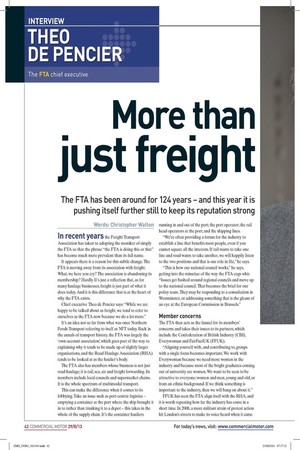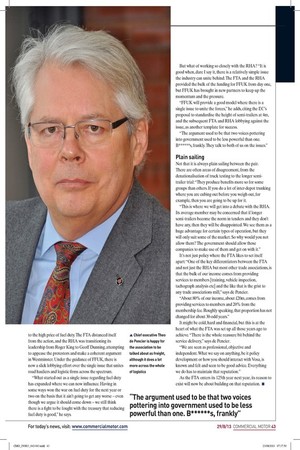INTERVIEW THEO DE PENCIER The FTA chief executive More than
Page 35

Page 36

If you've noticed an error in this article please click here to report it so we can fix it.
just freight The FTA has been around for 124 years and this year it is pushing itself further still to keep its reputation strong Words: Christopher Walton
In recent years the Freight Transport Association has taken to adopting the moniker of simply the FTA so that the phrase "the FTA is doing this or that" has become much more prevalent than its full name.
It appears there is a reason for this subtle change. The FTA is moving away from its association with freight. What, we here you cry? The association is abandoning its membership? Hardly. It's just a reflection that, as for many haulage businesses, freight is just part of what it does today. And it is this difference that is at the heart of why the FTA exists.
Chief executive Theo de Pencier says: "While we are happy to be talked about as freight, we tend to refer to ourselves as the FTA now because we do a lot more."
It's an idea not so far from what was once Northern Foods Transport referring to itself as NFT today. Back in the annals of transport history, the FTA was largely the 'own-account association', which goes part of the way to explaining why it tends to be made up of slightly larger organisations, and the Road Haulage Association (RHA) tends to be looked at as the haulier's body.
The FTA also has members whose business is not just road haulage; it is rail, sea, air and freight forwarding. Its members include local councils and supermarket chains. It is the whole spectrum of multimodal transport. This can make the difference when it comes to its lobbying. Take an issue such as port-centric logistics — emptying a container at the port where the ship brought it in to rather than trunking it to a depot — this takes in the whole of the supply chain. It's the container hauliers
running in and out of the port; the port operator; the rail head operators at the port; and the shipping lines.
"We're often providing a forum for the industry to establish a line that benefits most people, even if you cannot square all the interests. If rail wants to take one line and road wants to take another, we will happily listen to the two positions and that is our role in life," he says.
"This is how our national council works," he says, getting into the minutiae of the way the FTA cogs whir. "Issues get bashed around regional councils and move up to the national council. That becomes the brief for our policy team. They may be responding to a consultation in Westminster, or addressing something that is the gleam of an eye at the European Commission in Brussels." Member concerns The FTA then acts as the funnel for its members' concerns and takes their issues to its partners, which include the Confederation of British Industry (CBI), Everywoman and FairFuelUK
"Aligning yourself with, and contributing to, groups with a single focus becomes important. We work with Everywoman because we need more women in the industry and because most of the bright graduates coming out of university are women. We want to be seen to be attractive to everyone; women and men, young and old, or from an ethnic background. If we think something is important to the industry, then we will bang on about it." 1,I,UK has seen the FTA align itself with the RHA, and it is worth repeating how far the industry has come in a short time. In 2008, a more militant strain of protest action hit London's streets to make its voice heard when it came
to the high price of fuel duty. The FTA distanced itself from the action, and the RHA was transitioning its leadership from Roger King to Geoff Dunning, attempting to appease the protestors and make a coherent argument in Westminster. Under the guidance of1,I,UK, there is now a slick lobbying effort over the single issue that unites road hauliers and logistic firms across the spectrum.
"What started out as a single issue regarding fuel duty has expanded where we can now influence. Having in some ways won the war on fuel duty for the next year or two on the basis that it ain't going to get any worse — even though we argue it should come down — we still think there is a fight to be fought with the treasury that reducing fuel duty is good," he says.
But what of working so closely with the RHA? "It is good when, dare I say it, there is a relatively simple issue the industry can unite behind. The FTA and the RHA provided the bulk of the funding for FFUK from day one, but FFUK has brought in new partners to keep up the momentum and the pressure.
"I,I,UK will provide a good model where there is a single issue to unite the forces," he adds, citing the EC's proposal to standardise the height of semi-trailers at 4m, and the subsequent FTA and RHA lobbying against the issue, as another template for success.
"The argument used to be that two voices pottering into government used to be less powerful than one. B******s, frankly. They talk to both of us on the issues." Plain sailing
Not that it is always plain sailing between the pair. There are often areas of disagreement, from the denationalisation of truck testing to the longer semitrailer trial: "They produce benefits more so for some groups than others. If you do a lot of inter-depot trunking where you are cubing out before you weigh out, for example, then you are going to be up for it.
"This is where we will get into a debate with the RHA. Its average member may be concerned that if longer semi-trailers become the norm in tenders and they don't have any, then they will be disappointed. We see them as a huge advantage for certain types of operation, but they will only suit some of the market. So why would you not allow them? The government should allow those companies to make use of them and get on with it."
It's not just policy where the FTA likes to set itself apart: "One of the key differentiators between the FTA and not just the RHA but most other trade associations, is that the bulk of our income comes from providing services to members [training, vehicle inspection, tachograph analysis etc] and the like that is the grist to any trade associations mill," says de Pencier.
"About 80% of our income, about £20m, comes from providing services to members and 20% from the membership fee. Roughly speaking, that proportion has not changed for about 30-odd years."
It might be cold, hard and financial, but this is at the heart of what the FTA was set up all those years ago to achieve. "There is the whole reassure bit behind the service delivery," says de Pencier.
"We are seen as professional, objective and independent. What we say on anything, be it policy development or how you should interact with Vosa, is known and felt and seen to be good advice. Everything we do has to maintain that reputation." As the FTA enters its 125th year next year, its reason to exist will now be about building on that reputation. •













































